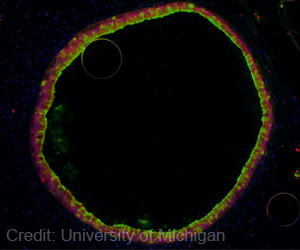 |
Backstabbing Bacteria |
Backstabbing bacterial cells that act in their own interests and do not cooperate with their infection-causing colleagues can actually reduce the severity of infection. The selfish behaviour of these uncooperative bacteria could be exploited to treat antibiotic-resistant infections, according to research being presented at the Society for General Microbiology's autumn meeting today.
Bacteria work together by using a well-studied communication system called Quorum Sensing (QS). During infection, bacteria talk to each other using QS to coordinate the release of toxins. Researchers at the University of Nottingham have discovered that in Staphylococcus aureus infections, bacteria defective in QS can benefit from 'opting out' of toxin production. By doing so, they can invest more energy in reproducing - whilst taking advantage of the nutrient-rich infection that is maintained by their neighbours.
By looking after themselves in this way, QS-deficient bacteria are quickly able to outnumber other bacteria that are busy producing toxins. As a result the overall severity of infection is reduced as fewer toxins are produced. "This opens up the interesting possibility of using these uncooperative bacteria to treat infection," said Eric Pollitt who is presenting the study.
 2:31 AM
2:31 AM
 Current Latest Health News International
Current Latest Health News International

 Posted in:
Posted in: 






0 comments:
Post a Comment